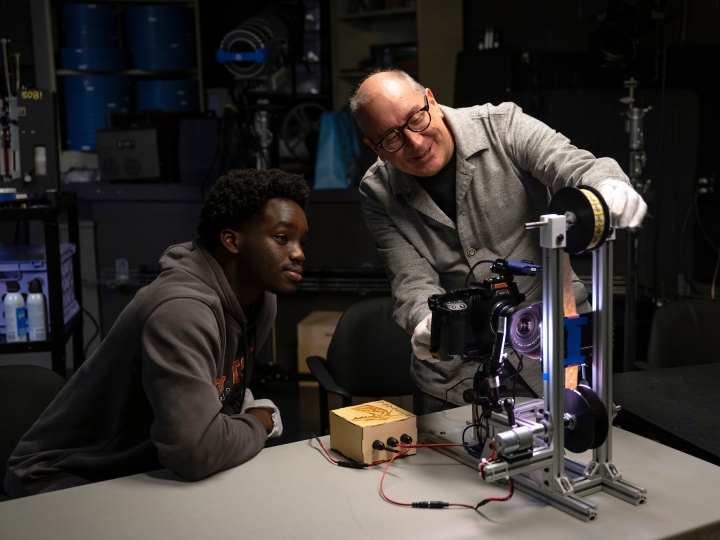
Grounding the Humanities
July 12, 2017
Zareen Taj Mirza '79 and her mother, Josephine "Dodie" Detmer '52. Photo by Gordon Wenzel
Appreciation for diverse disciplines and Islamic studies inspires family’s gift
By Susan Lindt
When Hildreth-Mirza Hall debuts next spring as the home of Bucknell's new Humanities Center, its name will honor the mother and daughter who jointly funded the project.
As with most great collaborations, there's a back story, and Hildreth-Mirza Hall's is an exotic one featuring a host of players: Bucknell's ninth president, Horace Hildreth; Dwight Eisenhower; Pakistan's first president, nicknamed "the strong man;" and a bit part played by a glass of pomegranate juice and its timely spill.
It is a shared love of the humanities that prompted Hildreth's daughter Josephine "Dodie" Detmer '52 and her own daughter, Zareen Taj Mirza '79, to make their gift. But individual life experiences also fueled their support.
It was 1949, and Hildreth, who had been Maine's governor, had just become president of Bucknell. Detmer soon transferred from Vassar College to join her parents at Bucknell, where she studied history. During Hildreth's four-year tenure, he met Penn State University President Milton Eisenhower, brother to Dwight, who was about to ascend to the U.S. presidency. Detmer believes that relationship prompted her father's appointment as U.S. ambassador to a fledgling Pakistan. It forever changed Detmer.
"I was the perfect age to go — 22 years old," Detmer says. "We arrived at a hard time. The monsoon had just hit Karachi. People were literally drowning in the streets. You could hear them crying. Oh God, it was awful. I went out to the refugee camps and passed out milk. That was our initial introduction. But that passed, and then it was a wonderful experience. It was a good time to be there. The country was new, and everyone was excited, encouraged and hopeful."
Detmer attended a party on a Navy boat one night. At her table was the dashing Humayun Mirza, who had recently returned to Pakistan after studying in Britain. Humayun's father, Iskander, was about to become the country's first president and earn the nickname "the strong man." She would soon marry Humayun, sweeping her along Pakistan's political ride.
"Humayun was handsome and intelligent. He spilled pomegranate juice all over my dress," Detmer says of that night at the party. "I fell in love with him. We lived there for a few years after my family left Karachi, and that was exciting. It was fascinating watching the political scene unfold. His father later recommended we leave the country — he was a very smart man, and he could see he had enemies who were about to pounce."
The couple moved to New England, where Zareen was born. They eventually divorced, and Detmer settled into a 30-year career teaching high-school history in Portland. She later remarried, but never forgot her experiences in Pakistan, where she came to love Islam.
"It's a wonderful religion. If we understood it better, we would appreciate it more — that's the rub," she says in her tidy Maine accent. "If people understood Islam, they might be more welcoming. It's such a global world. We've got to interact, and we've got to do it in an understanding fashion."
This is part of the good she hopes will come from their gift, which also endows the Josephine Hildreth Detmer & Zareen Taj Mirza Professorship in Islamic Studies — Bucknell's first position dedicated to the study of Islam.
"The humanities are important. They make you think about the world and broaden you," Detmer says. "Global understanding is the key to the world existing peacefully. And my daughter was very keen [to make the gift]. She influenced me because she loves Bucknell, and she believes in the humanities."
Mirza was a Russian studies major at Bucknell. When she heard about the opportunity to fund the project that would transform the former Delta
Upsilon house, it jogged her memory of a magical formal there some 40 years ago. "I'll always remember it because it was so exciting," Mirza says. But she also thought the gift could make a difference in the world. After all, her life's pursuits have always been grounded in the humanities.
"I preached, worked in business, painted and taught a little bit of English, so I truly do love the humanities," Mirza says. "And it's a tough time in the world right now. If we can educate people to understand how others think and live at their best rather than at their worst, it can be a background for a conversation — and it will be a much healthier conversation."
To learn more about the humanities at Bucknell, visit bucknell.edu/HumanitiesCenter.

